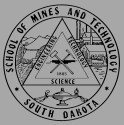 |
 |
 |
 |
 |
 |
||||||||
Welcome The Nano Science and Engineering Ph.D. Program at the South Dakota School of Mines and Technology is a multi-disciplinary Ph.D. program focusing on Nanoscience and Nanotechnology. The goal of Nanoscience and Nanotechnology is to manipulate matter at the atomic and “nano” length scales (dimensions from a few to 100’s of atomic radii), e.g. the molecular to mesoscopic levels, where new materials and phenomena have been discovered. The research required to engineer systems at these length scales will require professionals with a broad understanding of fundamental principles and the ability to cross-over into other fields. The Nano program provides the training to allow scientists and engineers to address these challenges, and the opportunity for students to engage in such research at the School of Mines while pursuing the Ph.D. About the Program The Nano Ph.D. program offers a research-intensive degree focused on nanoscience and nanotechnology, with current emphases in nano-electronics and nano-photonics (nΦ); nano-imaging and nano-biotechnology (nΧ); and nano-composites (nΣ) and their applications. A multi-disciplinary core curriculum is taken by students from diverse science and engineering backgrounds. These “core” courses are intended to introduce students to contemporary topics in nanoscience and nanotechnology, and to initiate a cross-disciplinary approach to research and learning. These courses can usually be completed in one, or at most two years. In addition to this core, students entering with an M.S. degree are required to take at least two electives outside the student’s traditional area of training. Students entering at the B.S. level will be expected to pursue, or take coursework equivalent to, an M.S. degree, in addition to the Nano standard curriculum.
Students from traditional science and engineering backgrounds enter the program with well-defined research interests and affiliate themselves with a research group and a faculty mentor. Current Nano program participants draw from the Departments of Chemistry and Applied Biological Sciences, and Chemical, Electrical, Materials and Metallurgical Engineering. Students with traditional training in related engineering and science fields participate in cross-disciplinary research with a nano focus. Examples of active research areas are: development of next generation solar cell technologies utilizing semiconductor nanostructures, development of advanced light and electron microscopies for nano-bio-imaging in live cells, mechano-biology of chondrocytes and their signaling pathways, development of nano-scale fluorescent energy transfer based sensors of intra-cellular forces in human epithelial kidney cells, synthesis and characterization of a variety of nanoparticle and nanofiber based nanocomposites, and multiple projects involving nano-scale spectroscopy of plasmonic and nanophotonic systems utilizing the near-fields of ultrafast lasers. Contact Information Research assistantships may be available. Please contact Steve Smith for information:
Calendars
| |||||||||||||

